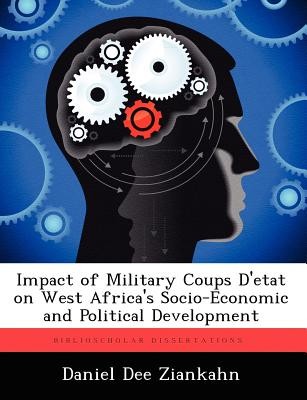
- We will send in 10–14 business days.
- Author: Daniel Dee Ziankahn
- Publisher: BiblioScholar
- ISBN-10: 1249403405
- ISBN-13: 9781249403401
- Format: 18.9 x 24.6 x 0.5 cm, softcover
- Language: English
- SAVE -10% with code: EXTRA
Impact of Military Coups D'Etat on West Africa's Socio-Economic and Political Development (e-book) (used book) | bookbook.eu
Reviews
Description
Following the period from 1957-1960, when most countries in West Africa broke loose from colonialism and became independent, the need for an integrated and classless society was one of paramount concern to most, if not all, West Africans. Up to date, the impact of colonialism was still being felt at every stratum of the sub-region. As former colonies of European powers began to gain independence from their colonial masters, the educated class eventually dominated and controlled the political landscape of their respective countries. The educated elites representing their countries' leadership with inherent authority over the military rarely used the armed forces for the intended purpose for which they were created. As the results of the military being used by politicians as an instrument of fear against their own citizens coupled with political misrule, the military soon began to seize and control state power through military coup d'etats. There were, however, disagreements and dissatisfactions within the ranks and file of the military which led to counter-coups and more often than not civil wars. As the results of these and many more, the sub-region's social-economic and political institutions have been devastated for the past three to four decades from which they are yet to recover.
EXTRA 10 % discount with code: EXTRA
The promotion ends in 14d.23:18:40
The discount code is valid when purchasing from 10 €. Discounts do not stack.
- Author: Daniel Dee Ziankahn
- Publisher: BiblioScholar
- ISBN-10: 1249403405
- ISBN-13: 9781249403401
- Format: 18.9 x 24.6 x 0.5 cm, softcover
- Language: English English
Following the period from 1957-1960, when most countries in West Africa broke loose from colonialism and became independent, the need for an integrated and classless society was one of paramount concern to most, if not all, West Africans. Up to date, the impact of colonialism was still being felt at every stratum of the sub-region. As former colonies of European powers began to gain independence from their colonial masters, the educated class eventually dominated and controlled the political landscape of their respective countries. The educated elites representing their countries' leadership with inherent authority over the military rarely used the armed forces for the intended purpose for which they were created. As the results of the military being used by politicians as an instrument of fear against their own citizens coupled with political misrule, the military soon began to seize and control state power through military coup d'etats. There were, however, disagreements and dissatisfactions within the ranks and file of the military which led to counter-coups and more often than not civil wars. As the results of these and many more, the sub-region's social-economic and political institutions have been devastated for the past three to four decades from which they are yet to recover.


Reviews